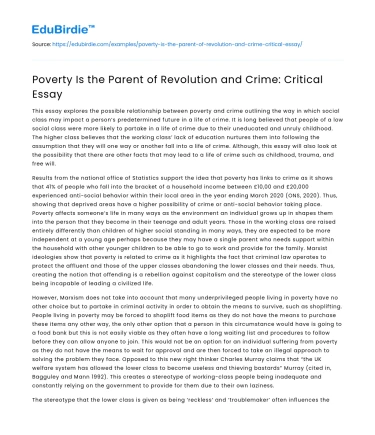This essay explores the possible relationship between poverty and crime outlining the way in which social class may impact a person’s predetermined future in a life of crime. It is long believed that people of a low social class were more likely to partake in a life of crime due to their uneducated and unruly childhood. The higher class believes that the working class’ lack of education nurtures them into following the assumption that they will one way or another fall into a life of crime. Although, this essay will also look at the possibility that there are other facts that may lead to a life of crime such as childhood, trauma, and free will.
Results from the national office of Statistics support the idea that poverty has links to crime as it shows that 41% of people who fall into the bracket of a household income between £10,00 and £20,000 experienced anti-social behavior within their local area in the year ending March 2020 (ONS, 2020). Thus, showing that deprived areas have a higher possibility of crime or anti-social behavior taking place. Poverty affects someone’s life in many ways as the environment an individual grows up in shapes them into the person that they become in their teenage and adult years. Those in the working class are raised entirely differently than children of higher social standing in many ways, they are expected to be more independent at a young age perhaps because they may have a single parent who needs support within the household with other younger children to be able to go to work and provide for the family. Marxist ideologies show that poverty is related to crime as it highlights the fact that criminal law operates to protect the affluent and those of the upper classes abandoning the lower classes and their needs. Thus, creating the notion that offending is a rebellion against capitalism and the stereotype of the lower class being incapable of leading a civilized life.
Save your time!
We can take care of your essay
- Proper editing and formatting
- Free revision, title page, and bibliography
- Flexible prices and money-back guarantee
However, Marxism does not take into account that many underprivileged people living in poverty have no other choice but to partake in criminal activity in order to obtain the means to survive, such as shoplifting. People living in poverty may be forced to shoplift food items as they do not have the means to purchase these items any other way, the only other option that a person in this circumstance would have is going to a food bank but this is not easily viable as they often have a long waiting list and procedures to follow before they can allow anyone to join. This would not be an option for an individual suffering from poverty as they do not have the means to wait for approval and are then forced to take an illegal approach to solving the problem they face. Opposed to this new right thinker Charles Murray claims that “the UK welfare system has allowed the lower class to become useless and thieving bastards” Murray (cited in, Bagguley and Mann 1992). This creates a stereotype of working-class people being inadequate and constantly relying on the government to provide for them due to their own laziness.
The stereotype that the lower class is given as being ‘reckless’ and ‘troublemaker’ often influences their behavior into fulfilling the expectations that society has bestowed upon them with these labels. The media plays a huge part in ensuring that those living in poverty are seen are less fortunate and worthy of attention by painting them as criminals. This is unsurprising as many news outlets are controlled by those of high social standing who wish for society to see those of a lower class as vagabonds and thugs. Growing up in poverty meant that these people had no way of possibly deterring the way in which people viewed them as they did not have the power in society to encourage the news outlets and peers to view them any differently. The subcultural theory of status frustration emphasizes the way in which lower-class people would act out into reaching the expectations of society as lower-class boys in school would misbehave and draw attention to themselves in a negative way to reach the expectations of their peers rather than what the teachers may have thought of them (Albert Cohen 1995).
Did you like this example?
Make sure you submit a unique essay
Our writers will provide you with an essay sample written from scratch: any topic, any deadline, any instructions.
Cite this paper
-
APA
-
MLA
-
Harvard
-
Vancouver
Poverty Is the Parent of Revolution and Crime: Critical Essay.
(2023, October 27). Edubirdie. Retrieved February 3, 2025, from https://edubirdie.com/examples/poverty-is-the-parent-of-revolution-and-crime-critical-essay/
“Poverty Is the Parent of Revolution and Crime: Critical Essay.” Edubirdie, 27 Oct. 2023, edubirdie.com/examples/poverty-is-the-parent-of-revolution-and-crime-critical-essay/
Poverty Is the Parent of Revolution and Crime: Critical Essay. [online].
Available at: <https://edubirdie.com/examples/poverty-is-the-parent-of-revolution-and-crime-critical-essay/> [Accessed 3 Feb. 2025].
Poverty Is the Parent of Revolution and Crime: Critical Essay [Internet]. Edubirdie.
2023 Oct 27 [cited 2025 Feb 3].
Available from: https://edubirdie.com/examples/poverty-is-the-parent-of-revolution-and-crime-critical-essay/
copy






 Stuck on your essay?
Stuck on your essay?

